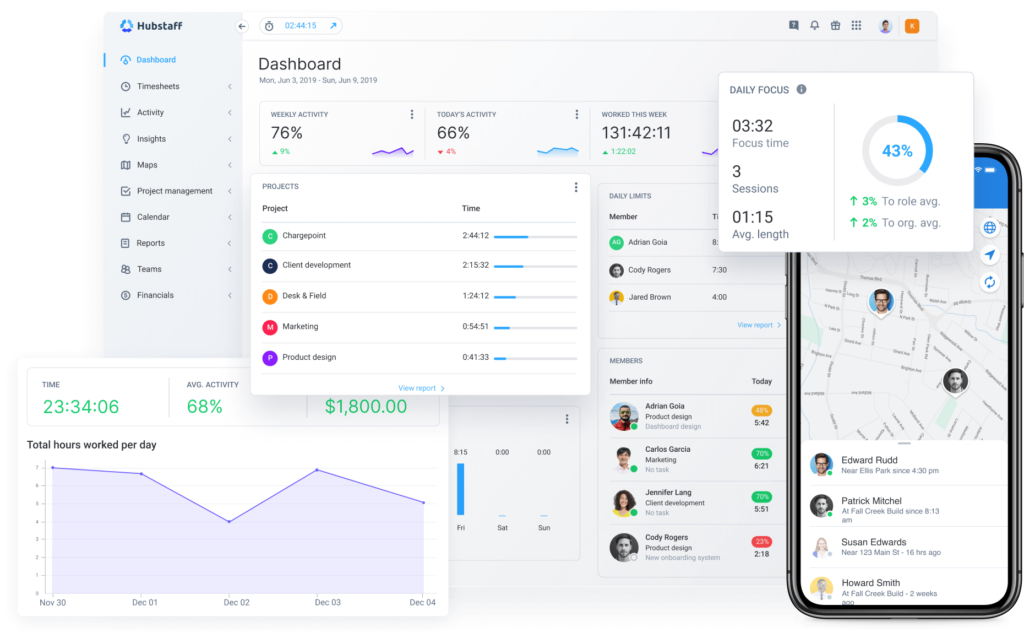Remote work is booming, and it’s showing no signs of slowing down. Maybe I’m a bit biased as a fully remote worker, but there’s no better time to consider some remote business ideas.
What was once a niche way of working is now mainstream, largely thanks to technology and the shift in how businesses operate. This shift presents a golden opportunity for aspiring entrepreneurs to take advantage of remote business ideas one can launch from home.
Thinking about launching a social media management service or starting an online tutoring business? It’s a great time to bring that business idea to life. The beauty of remote businesses is their inherent flexibility that allows you to scale at your own pace while enjoying the benefits of lower overhead costs.
Why start a remote business?
Starting your own business remotely offers several advantages that traditional brick-and-mortar businesses can’t match. Here’s why it’s an appealing option:
- Flexibility. Running a remote business helps with work-life balance as you can operate from home, a café, or while traveling — all you need is a reliable internet connection.
- Lower overhead costs. Unlike a traditional office setup, most remote businesses don’t require costly infrastructure, leases, or physical inventory. When you eliminate costs like rent, utilities, and office supplies, you reduce financial risk and have more room to invest in other areas like marketing or growth.
- Global reach. One of the most powerful aspects of any online business is the ability to reach a global audience — and also a global talent pool. Whether you’re offering services or selling products, the internet makes connecting with international clients or customers easier.
Collectively, these factors make remote work an increasingly attractive choice. Potentially low startup costs and virtually no geographical limitations are hard to pass up for entrepreneurs.
Key considerations before starting a remote business
Before giving yourself the green light on a new remote business idea, you need to keep a few things in mind. These will help set up your venture for long-term success:
- Market demand. Is there a demand for your service or product? Do some market research to understand what potential customers are looking for and how saturated the field might be.
- Initial investment. Although remote businesses generally have low startup costs, some initial investment may be required for materials, software, or other technology. For example, an online store might require investment in a website, payment gateways, inventory management systems, and raw materials.
- Tools and skills. Each business model requires specific tools and skills. For example, launching an online tutoring business will require reliable communication tools and a strong grasp of your subject matter.
Starting a remote business is exciting and challenging. But to turn your entrepreneurial dream into a reality, you must plan carefully and cover all gaps in finances, knowledge, and experience.
Boost your team’s efficiency with Hubstaff's productivity tools
Top remote business ideas for 2025
Freelance services
Freelancing has become one of the most accessible ways to turn your skills into a thriving remote business.
From writing and graphic design to digital marketing, freelancers can offer their expertise to clients across the globe. And with platforms like Upwork and Fiverr, connecting with potential clients is easier than ever. For many, this makes freelancing or starting a design, writing, or photography business an enticing home business idea.
Pros
- Flexible work hours. You set your own schedule, allowing for a healthy work-life balance.
- Diverse client base. Freelancers can work with clients from different industries, expanding their experience.
- Minimal startup costs. All you need is a laptop, an internet connection, and maybe some job-specific software to get started.
- Scalability. Freelancers can transition into agency models, adding more services or subcontractors.
Cons
- Inconsistent income. Freelance work can vary, leading to periods of feast or famine.
- Self-discipline required. Without a structured environment, staying productive can be challenging.
Online coaching and consulting
Online coaching and consulting allow you to turn your knowledge into a successful online business. You can offer guidance on various topics, such as career advancement, wellness, business consulting, and more.
Coaching relies heavily on your skill to market and teach your abilities. Tools-wise, online communication platforms like Zoom or Skype get you quite far.
Pros
- High earning potential. You can charge premium prices for one-on-one sessions or group coaching programs.
- Low overhead. Coaching primarily requires your expertise and basic online tools, keeping expenses minimal.
- Global reach. Offer services from anywhere in the world, working with clients across time zones.
Cons
- Requires a strong reputation. Building trust and authority in your niche takes time and effort.
- High competition. The coaching field is saturated. You have to stand out.
E-commerce store
Starting an e-commerce store is a popular choice for entrepreneurs who want to capitalize on the growth of online shopping. E-commerce businesses allow you to build a strong online presence, potentially worldwide.
Pros
- Scalability. E-commerce can grow from small side hustles into full-scale businesses.
- Passive income potential. Automation tools allow you to generate sales even while you sleep.
- Multiple revenue streams. You can diversify by selling physical products, digital goods, or through affiliate marketing.
Cons
- Inventory management. Storage and shipping can become logistical headaches if you’re selling physical products.
- Stiff competition. Standing out in a saturated e-commerce market requires effective marketing strategies — you’ll be competing against small business owners, established juggernauts, and everything in between.
Digital marketing agency
Marketing is one of the oldest trades in history, but it continues to evolve rapidly. A digital marketing agency helps businesses improve their online presence through SEO, content marketing, and social media strategies. If you have experience in these fields, starting an agency can be a lucrative remote business.
Pros
- High demand. As more businesses move online, the need for digital marketing expertise increases.
- Recurring revenue. Many clients need ongoing services like SEO or content creation.
- Scalable model. You can start as a solo marketer and eventually build a team or outsource tasks.
Cons
- High expectations. Clients often expect measurable results quickly. Given that some aspects of digital marketing (like organic growth) take time to take effect, this can add pressure as you work to get your business off the ground.
- Client management. Handling multiple accounts can be time-consuming, especially when scaling.
Virtual assistant services
The demand for virtual assistants has surged as businesses seek remote help for administrative and organizational tasks. From managing emails to scheduling appointments, a VA business is an excellent way to start working from home while also saving on startup costs.
Pros
- Accessible startup. With strong office skills and a computer, you can start your VA business without needing a large investment or advanced certifications.
- Diverse opportunities. You can specialize in various industries like real estate, marketing, or finance, letting you tailor your services to specific client needs.
- Flexible working hours. Depending on your client load and business goals, you can decide whether to take on part-time or full-time commitments.
- Cost-effective. By expanding to a global talent pool, you can not only find VAs fluent in other languages, but you may also find favorable exchange rates in the process.
Cons
- Lower earning potential. Unless you specialize in a high-demand niche, virtual assistant services can be low-paying.
- Task variability. Because clients may require many duties, you’ll need to find virtual assistants with highly specific skill sets.
Remote tech support
Remote tech support allows you to assist businesses or individuals with their IT issues from afar. This home-based business requires technical expertise and effective communication to solve problems remotely.
Pros
- Constant demand. Technology is ubiquitous and will only continue growing. IT support is essential for businesses.
- Low overhead. You can offer services from home with just a computer, essential software, headsets, and other affordable hardware.
- Flexible work. You can provide support to clients across different industries and locations.
Cons
- Constant troubleshooting. Handling urgent issues or outages can lead to stressful situations.
- Specialized knowledge needed. Technical expertise is a must, and some issues may require in-depth skills or certifications.
Online course creation
If you have knowledge in a particular area, creating and selling online courses can be a sustainable business model. Platforms like Teachable and Udemy make it easier to design courses and reach a global audience. This is a great way to establish a successful online business while helping others learn new skills.
Pros
- Scalable income. Once the course is created, it can generate passive income over time.
- Low overhead costs. Beyond the course creation, there are a few ongoing expenses. Most platforms handle hosting, marketing, and payment processing, which then reduces the financial burden on course builders.
- Global audience. You can teach people from around the world, regardless of location.
Cons
- Time-consuming setup. Developing a high-quality course takes a significant time investment initially.
- Marketing required. Success depends on your ability to reach the right audience and market your course effectively.
Remote project management
Experienced project managers can offer their skills to businesses by managing projects remotely. Using online communication tools and project management platforms, you can oversee teams, meet deadlines, and help clients execute their business plans.
Pros
- High demand. Many businesses need project managers to keep remote teams on track.
- Strong earning potential. Project management is a specialized skill that commands competitive rates.
- Diverse industries. You can work in various sectors, from tech to marketing and beyond.
Cons
- Challenging coordination. Managing remote teams across time zones can be complicated.
- Heavy responsibility. As the central figure in projects, you may face pressure to meet deadlines and handle conflicts.
Affiliate marketing
Affiliate marketing generates income by promoting products or services from other companies. It’s a great business idea for those looking to earn commissions through online business models. Success depends on building a platform with a loyal audience, such as a blog or YouTube channel.
Pros
- Low entry barrier. You can start with no products or inventory of your own.
- Passive income. Once established, affiliate links can generate income without constant involvement.
- Multiple niches. You can choose products or services that align with your audience’s interests.

Cons
- Income depends on traffic. You need a strong audience to make consistent earnings.
- High competition. Many affiliate marketers compete for the same audience and products.
Content creation and monetization
Content creators can earn income by monetizing their platforms through ads, sponsorships, and affiliate marketing. They can monetize through various platforms like blogging, YouTube, and social media. This business model can be highly profitable with the right target market.
Pros
- Creative freedom. You can build a brand around your interests and passions.
- Multiple revenue streams. Monetize through ads, affiliate marketing, sponsorships, and product sales.
- Scalable. As your audience grows, so does your earning potential.
Cons
- Time-consuming. Building a loyal audience and creating high-quality content takes time.
- Inconsistent income. Monetization depends on audience engagement, which can fluctuate.
How to choose the right remote business idea
While the opportunities are vast, not every remote business idea will suit your skills or align with market demand.
Your ideal business should play to your strengths while also addressing a need in the market. Find a balance between what you’re passionate about, what you’re good at, and what has the potential to be a successful business.
Aligning with your skills and passion
When selecting a business idea, it’s important to start by evaluating your existing skills and interests.
Leveraging what you already know gives you a head start. Choose a business that taps into your expertise, but also something you’re passionate about.
For instance, if you enjoy writing and have a knack for storytelling, starting a blog or offering online services like copywriting could be a great fit. When you love what you do, it’s easier to stay motivated — even when inevitable challenges arise.
Assessing market demand
Even the best business plan will fall short if there isn’t sufficient demand for your service or product.
Before committing to an idea, conduct thorough market research to assess its viability. Look into trends, analyze competitors, and understand the needs of your target audience.
For example, if you’re considering offering management of social media accounts, check how saturated the market is and if there are opportunities to get more niche. A solid understanding of market demand will inform your growth strategy and help you tailor your marketing strategy to attract the right customers.
Tools and resources for running a remote business
Running a remote business requires the right tools to maintain productivity, communication, and efficient operations — especially when you’re managing teams without a physical office. Using the right platforms can make the difference between smooth operations and costly bottlenecks.
Essential tools for remote entrepreneurs
To work effectively remotely, you’ll need a suite of tools that streamline processes and allow remote employees to collaborate efficiently while also working across different time zones.
- Slack. This popular communication platform keeps teams connected through direct messaging, channels, video conferencing (huddles), and integrations with other tools.
- Trello. A Kanban project management tool that allows you to organize tasks set deadlines, assign work, and create workflows.
- QuickBooks Online. An accounting tool that simplifies bookkeeping, invoicing, and tax preparation for better financial management without a dedicated accountant.
- Zoom. A video conferencing platform that facilitates meetings, webinars, and team collaboration regardless of location.
- Google Workspace. This suite of cloud-based productivity tools helps teams collaborate on documents, spreadsheets, and presentations in real time.
- Hubstaff. A global time tracking app designed to help remote teams track hours, boost productivity, and pay their team to reduce admin time.

Building an online presence
A strong online presence is necessary to attract clients and grow your remote business. Start by creating a professional website that highlights your specialized services and brand. Then, create high-quality content, place relevant keywords, and optimize for mobile devices.
Social media is equally important for reaching your target audience and driving traffic to your website. Platforms like LinkedIn, Twitter, and Instagram can help establish your brand, share updates, and engage with potential clients.
To support faster business growth, be consistent with your branding across all platforms. Invest time in regularly updating your website and social media accounts. You’ll need to then make sure they reflect your business structure and the quality of services you offer.
Conclusion
Remote working opportunities are vast, but success won’t come overnight. Building a business from scratch, especially remotely, takes effort, persistence, and patience. There’s no magic formula — just a lot of hard work and thoughtful planning.
The beauty of these ventures is that, when done right, you get to work remotely, set your own hours, and structure your business around your life. It’s rewarding to create something that aligns with your skills and passions without sacrificing the freedom to operate from anywhere.
If you’re ready to dive into these remote business opportunities, now is the perfect time to take that first step. To help your operations run smoothly, tools like Hubstaff can help you track time, streamline payroll, and gauge productivity for any team members you employ, especially for businesses with remote teams. Try Hubstaff’s free 14-day trial now.
Most popular
The Fundamentals of Employee Goal Setting
Employee goal setting is crucial for reaching broader business goals, but a lot of us struggle to know where to start. American...
Data-Driven Productivity with Hubstaff Insights: Webinar Recap
In our recent webinar, the product team provided a deep overview of the Hubstaff Insights add-on, a powerful productivity measurem...
The Critical Role of Employee Monitoring and Workplace Security
Why do we need employee monitoring and workplace security? Companies had to adapt fast when the world shifted to remote work...
15 Ways to Use AI in the Workforce
Whether through AI-powered project management, strategic planning, or simply automating simple admin work, we’ve seen a dramatic...




